As the election season draws nigh, the decibels of social commentary grow louder as political opinions are birthed, nurtured, and evangelized on the premise of inherent political desires and bias. Electioneering could be theoretical or practical. Social media is where the theories are domiciled. The grassroots is where electoral practices are delivered.
A few weeks ago, NOI Polls Limited released the results of its quadrennial opinion poll and like the rest of all other opinions in politics – it lacked conventional empirical data. Hence why the esoteric few who understand how Nigerian politics work questioned the statistical percentages allocated horizontally and vertically across geographical zones and candidates.
Were these results data-driven or sentiment-driven? Are they factual or fictional?
Elections in Nigeria are often viewed as defining. But on the prism of cynicism, they are not life-changing because Nigeria is on a steep decline and whoever is elected either accelerates the decline or decelerates it. Because the capacity to alter the direction is increasingly moot due to the absence of institutions and ideologies that support the continuity of good policies and programmes. This is the tough pill many cannot swallow.
One can easily predict that the Naira would be farther from the Dollar irrespective of who becomes President in the next year, decade or century. Another thing predictable is electoral patterns and recent electoral data makes it a tad inconceivable that a party outside the top 2 establishments would win by a landslide as the NOI poll suggests.
In the just concluded Ekiti gubernatorial election, Labour Party scored 195 votes out of 351,865 votes representing 0.05% of the total votes cast.
In the 2022 Osun gubernatorial election – Labour Party had 2,729 votes out of 804, 450 representing 0.34% of the total votes cast.
In 2021, Anambra gubernatorial election, Labour party scored 2,802 votes out of 241,523 votes representing 1.16% of total votes cast.
In the 2019 Presidential elections, Voters of the 70+ other parties outside the big 2 had combined votes of 759,562, significantly below the ruling party APC’s 15,191,847.
The Labour Party had 5,074 votes out of 27,324,583 representing 0.02% of the total votes cast.
Taking into context that political participation is at an all-time high given INEC’s recent postulation of 96 million registered voters for the upcoming elections, it could signal that Nigerians are ready to voice out their frustrations at the ballot box.
But if the poll is relying on “new voters” to turn the tide – about 12 million of them, they might be mistaken. The north-west accounted for the highest registrants with 2,514,273 newly registered voters – the ruling party has the majority of the 6 governors in that zone.
If we break it down state by state – Lagos (APC) and Kano (APC) had the highest number of new registrants with 585,620 and 569,103 respectively. Delta State (PDP) trailed them with 523, 517 newly registered voters.
Now the way politics work is, the governors are expected to “deliver” their zones, whether they do is another kettle of fish but they have the advantage with the “structures”- a largely unpopular word in today’s political discourse.
Data also shows the ruling party gained more strides in South East. The ruling party APC polled 198,248 votes in the five South-East states in 2015. In 2019, the party polled 403,958 votes despite Peter Obi being on the opposition ticket. So the party’s electoral popularity grew by 103% in the South East in 2 election cycles.
So how is the APC projected to get 0% in that region in 2023? The PDP has always been dominant in the South-East so how are they getting 1% in that region?
Similarly in the South-South, the APC and PDP recorded 1.05 million (31%) and 2.2 million (66%) in the 2019 presidential elections and now the poll says they would both record 2% and 6% of the votes in that region come 2023? Come on.
Understandably, the dynamics might have changed as the Labour party candidate represents a demography of the electorate who allege they have been marginalized so this is an opportunity for a united front to back their man. The candidate is also perceived to be different from the political status quo so a new subset of the electorate has entrusted their faith in him.
Arguments that the candidate will win irrespective of the party is a distortion from reality and a figment of the pollist’s imaginations. Politics is not rocket science or blockchain, it’s actually easy to decipher patterns based on electoral precedents. Voting behaviour is predictable because majority of voters vote with personal interests. Personal interests could be influenced by pecuniary inducements or ethnic sentiments which the establishment parties take advantage of.
Conclusively, a much larger sample size could have been examined and a voters card should have been a prerequisite for participating in the poll so we can get closer to electoral reality which oftentimes is parallel to social media’s reality. Additionally, saying insecurity (45%) precedes economy (20%) on the mind of the electorate can be a bit questionable as inflation, purchasing power parity and exchange rates topics are prevalent more times than not in Nigerians’ discussions. In the next few months, we would know, which candidate will assume poll position to be Nigeria’s president.

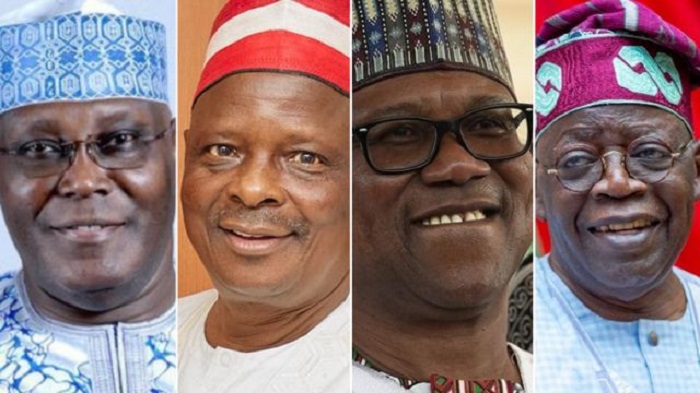


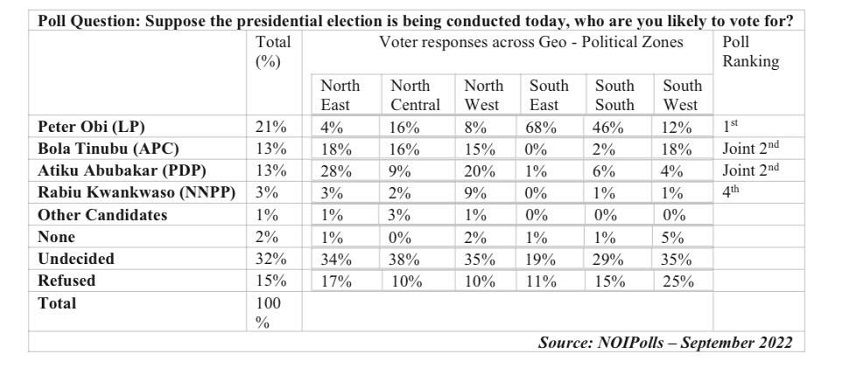
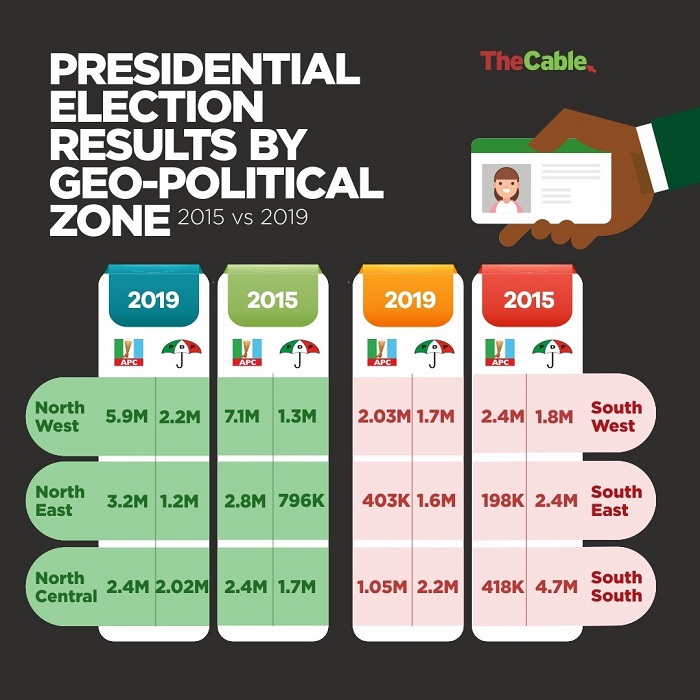





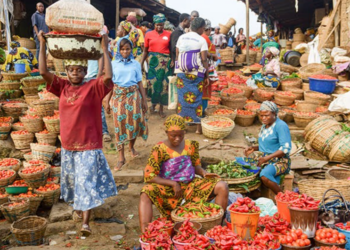

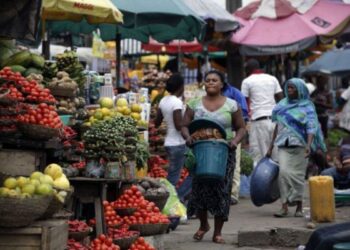











The same way Andy Uba bought over many of the who is who in Anambra State politics to APC and started asking philosophical questions after the election is how the author will continue asking questions when the results are announced.
If I may help you, don’t expect the voting population to be “zombies” who must vote who they voted the last time. Don’t expect that the political awakening happening now will turnout the same low percentage of voters that characterized previous elections. Those who didn’t turn out before are increasingly deciding to turn out because they have found a reason to do so.
Sorry to burst your bubble: Any analysis of the current political climate based on historical figures are either mischievous or borne out of sheer ignorance. If per chance you were paid, feed your sponsor back that the tides are too high to overturn. You can not fight an idea whose time has come.
Superb & objective analysis.